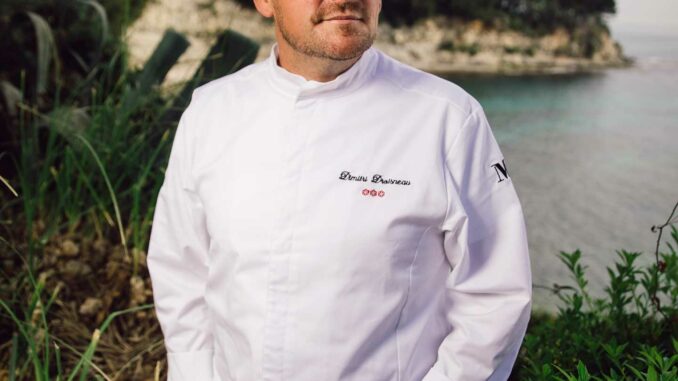
Experience La Villa Madie in Cassis, led by Chef Dimitri Droisneau, a three-star Michelin-starred chef renowned for refined Mediterranean fine dining rooted in local terroir and seasonal cuisine.
Perched above the Mediterranean in Cassis, La Villa Madie is now firmly among France’s most celebrated fine dining addresses. Under the stewardship of Chef Dimitri Droisneau, the restaurant earned its long-coveted three Michelin stars in 2022, transforming a quietly ambitious coastal house into a world-class destination. While much of the gastronomic world may have slept on this “hidden gem,” its recent ascent has attracted notice not only for its French gastronomy and signature dishes but also for its spirit of restraint, local fidelity, and understated elegance.
What makes La Villa Madie compelling is not only its technical mastery, but the sense that the cuisine extends the landscape—sea, cliffs, light—into the plate. Diners come for more than a meal: they come for an immersive experience that balances rigor and poetry, in a setting where the sustainable cuisine ethos is quietly lived. In this article I trace the chef’s personal journey, his philosophy, and how La Villa Madie crafts an unforgettable encounter with terroir, seasonality, and hospitality.
The chef: vision and background
Origins and education
Dimitri Droisneau was born on 11 January 1980 in Évreux, Normandy. He grew up in L’Aigle (Orne), in a modest household in which his mother, who did occasional tailoring work, insisted on home-cooked meals, exposing him from childhood to the joy of simple, sincere food.
At age 15, he began his formal culinary path as an apprentice under Michel Canet at the Grand Saint-Michel in Alençon. Canet is often cited by Droisneau as a formative influence—patient, attentive, quality-driven. From there, Droisneau secured placements in Paris’s most venerable kitchens: La Tour d’Argent, Lucas Carton (under Alain Senderens), Le Bristol (with Éric Fréchon), and L’Ambroisie (with Bernard Pacaud).
These Paris years were not merely résumé builders; Droisneau often remarks in interviews that his time with Bernard Pacaud—whose humility, deep respect for product, and disciplined technique impressed him greatly—was pivotal in helping him find his own voice.
In the late 2000s he moved to the Côte d’Azur, joining La Réserve de Beaulieu as executive chef, where he also met his future wife, Marielle Droisneau. In 2013 the couple took over La Villa Madie in Cassis.
Marielle herself has a distinguished background: she trained through the school of Michel Bras in Aveyron, and later worked with Michel Guérard, Marc Veyrat, Martin Berasategui, and at La Réserve in Beaulieu—so when she joined the project at Cassis, she already carried a deep sensibility of hospitality and authenticity.
Thus, the Villa Madie venture is very much a partnership: Droisneau oversees the kitchen while Marielle shapes the service experience and the ambiance.
Culinary philosophy and style
Droisneau’s culinary philosophy is anchored in locality, seasonality, and an attempt to translate the coastal Provençal landscape into ephemeral “ecosystems” on the plate. While the Mediterranean light and maritime ingredients shape the terrain, his Normandy roots and Paris training provide discipline, balance, and technique.
He often speaks of the inexorable connection between product and producer: each ingredient must carry the signature of where it comes from. He aims for dishes composed but not overworked—no more than five or six elements per dish, clarity over artifice. His cuisine may be subtle, but it is precise: the salty, the iodine, the mineral and vegetal notes often play in tension.
According to Le Monde, Droisneau and Marielle often repeat “we are innkeepers” as a kind of leitmotif—there is hospitality at the core. He refuses to become a star chef persona; he wants people to come because of the food, not for spectacle.
He also strives to maintain continuity in his menus. Rather than abrupt changes, dishes evolve through the seasons; they morph gradually, rather than wholesale reinventions.
His approach is distinctly Mediterranean but never vulgar—always tempered by classic French technique. He is sometimes grouped into a new Riviera generation: flamboyant in flavor but modest in gesture.
Awards and recognition
The Michelin journey of La Villa Madie under Droisneau is striking:
- Shortly after taking over in 2013, the restaurant earned its second Michelin star in 2014.
- In March 2022, La Villa Madie was awarded its third Michelin star—a leap that placed Droisneau among the elite of French gastronomy.
- In September 2022, he was voted “Chef of the Year” by his peers via Le Chef magazine.
- The Gault & Millau guide accords him high marks; he is often rated among the top French chefs (Gault & Millau notes him as part of their “magnifiques” and his restaurant profile carries high scores).
- The restaurant itself is listed in the Michelin Guide as a three-star gem in Provence.
- On The World’s 50 Best Discovery, La Villa Madie is featured for its seasonal reinterpretations and gastronomic vision.
Beyond stars, the prestige of being part of the French three-star cohort—and doing so with relative modesty—speaks volumes in terms of influence and respect in professional circles.
Broader influence
Although Droisneau does not operate a large chain of restaurants, his influence is felt through several vectors:
- His commitment to sustainable sourcing, local producers, and traceability has become a quietly powerful model in the Côte d’Azur gastronomic community.
- He teaches by example: his kitchen has drawn attention for nurturing younger chefs under a philosophy of humility and craft.
- He actively remains embedded in the Cassis community—not just gastronomically but socially. He is co-president of the Cassis Rugby Club (CRC).
- He abstains from turning himself into a brand; rather, he supports the notion that a chef’s name should elevate the restaurant, not eclipse the cuisine.
- His style as a “quiet” three-star chef challenges the more flamboyant archetype, offering an alternative path in French gastronomy: discretion, depth, terroir.
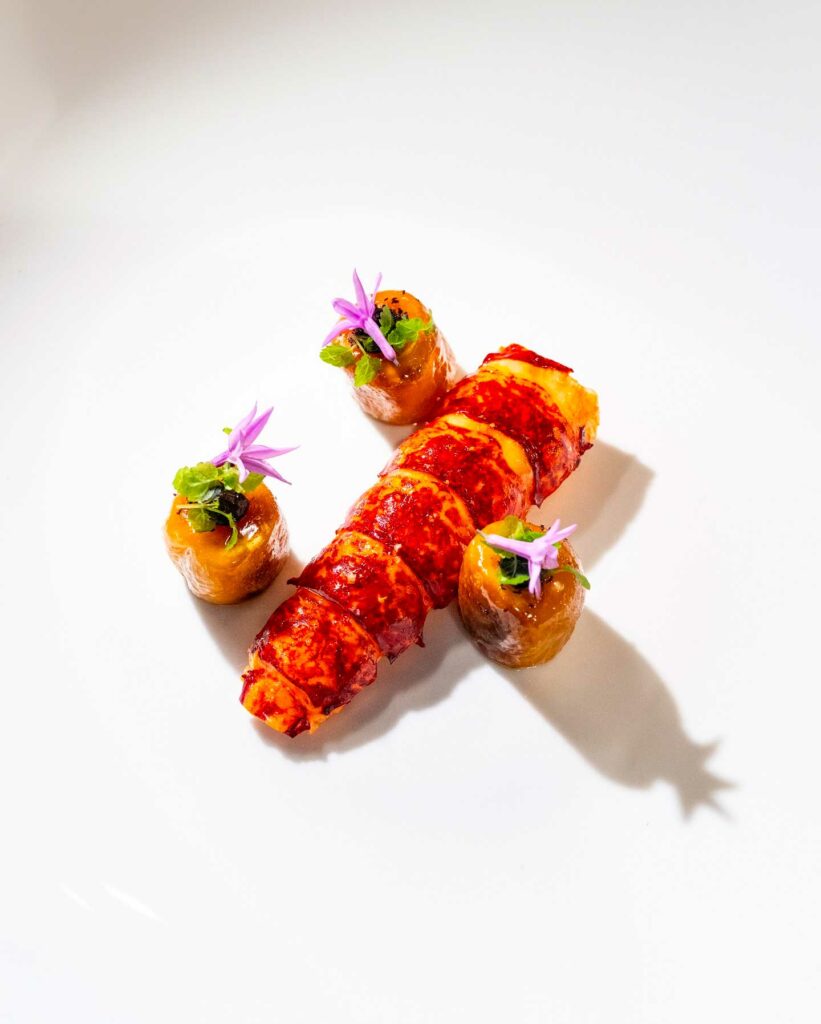
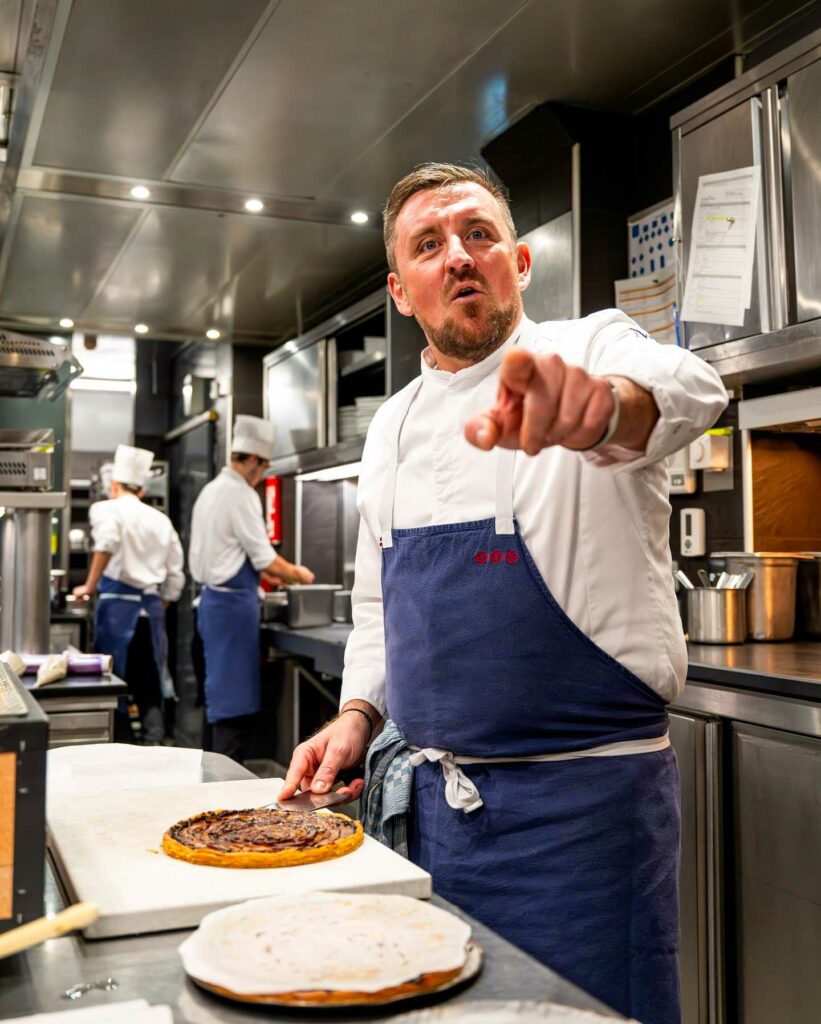
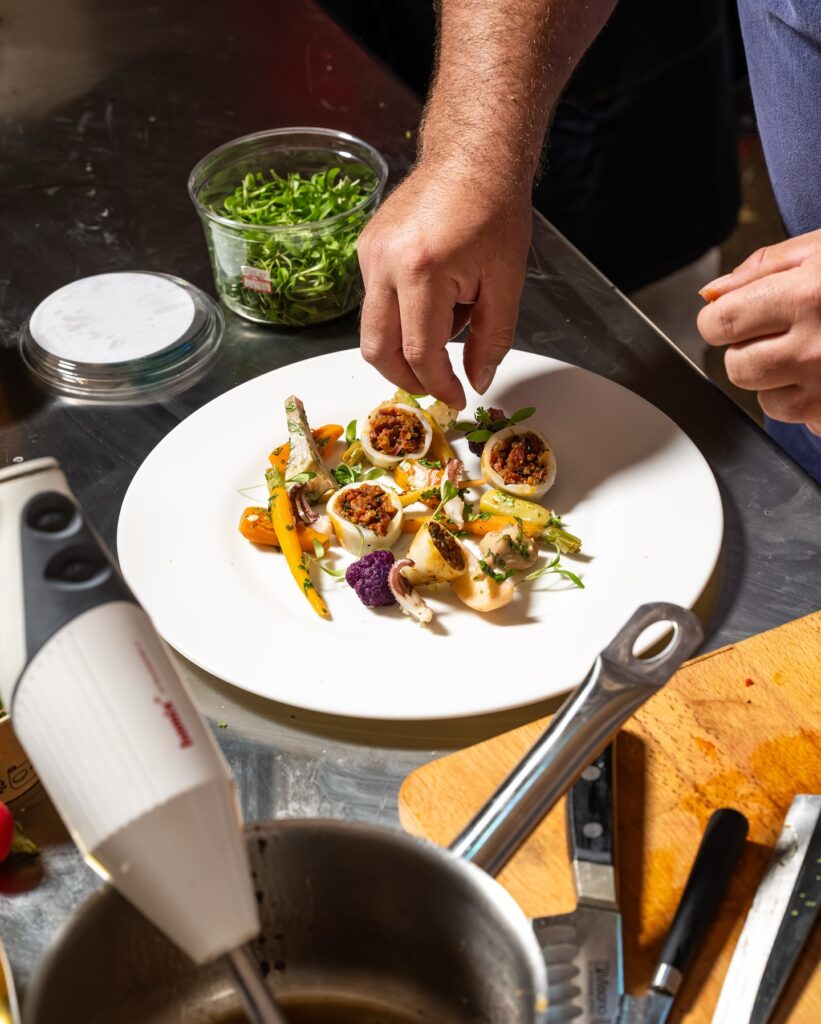
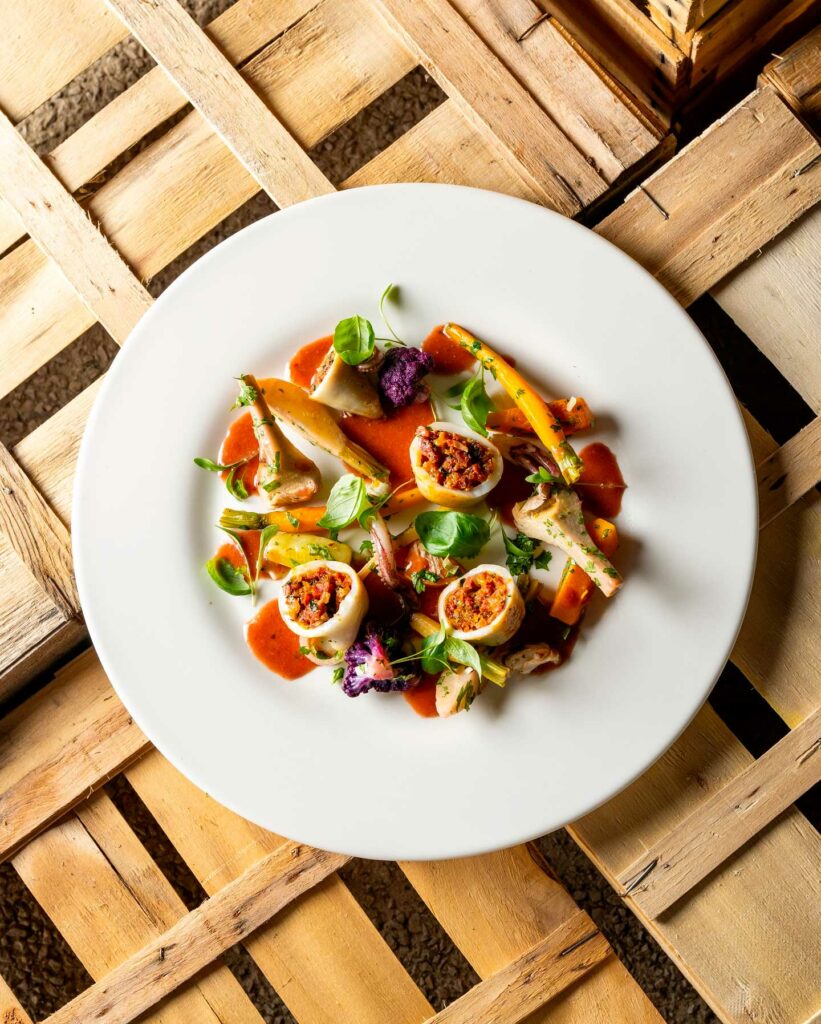
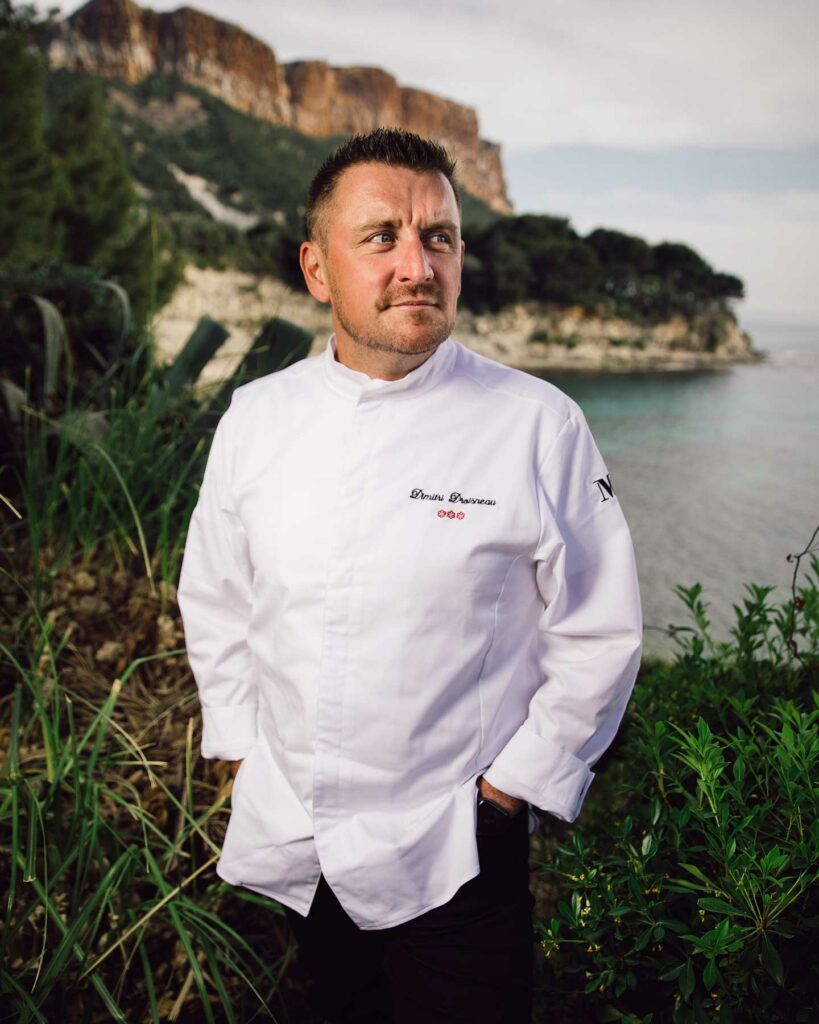
The restaurant: concept and experience
Location and atmosphere
La Villa Madie sits in the Anse de Corton (Corton Cove), facing Cap Canaille—one of Europe’s highest sea cliffs—just above the turquoise Mediterranean coastline in Cassis. The architecture is contemporary but gentle—light wood, pastel tones, clean lines, and big glass windows create a relaxed modernism that invites the sea and sky to fold into the space. The terrace overhangs directly above the water, giving diners almost the sensation of floating above the sea.
Inside, the design leans toward minimal luxury—it is elegant without ostentation, letting the views and light be part of the décor. The entrance is modest, the service discreet, the effect cohesive: every element is calibrated to frame the cuisine and the landscape, rather than to compete with them.
It is worth noting that Droisneau has often asserted, in interviews, that guests should come for the cuisine—not merely for the panoramic views.
In addition, the couple operate Brasserie du Corton (on a floor adjacent), a more casual bistro alternative to experience their cooking in a lighter format.
Cuisine and signature dishes
La Villa Madie presents menus that evolve constantly with the seasons, rooted in a dialogue between land and sea. There is, perhaps, no single “signature dish” that is fixed forever—but certain ingredient themes recur: sardines, Carabineros (deep-sea red prawns), seafood from the nearby port, aromatic herbs and saline notes.
One oft-cited example is Carabineros shrimp with beet and kumquat, a contrast of iodine, sweetness, and acidity that balances delicately. Other enticing plates mentioned in press reviews include:
- Sardine marinated, caviar of eggplant, crispy squid ink pastry
- Scallops (Saint-Jacques) from Normandy, grilled after marination, with leek vinaigrette scented with orange zest
- Gamberoni (large prawns) in a marine bouillon with rouget, artful layering of brine and freshness
- Occasionally, more classic French references: a lièvre à la royale (royal hare) with foie gras and armagnac emulsion—when the land demands its place.
What is striking in reviews is the restraint: reviewers often note that no dish overreaches; none has more than five elements. The elegance lies in subtle complexity, not ostentatious gestures. The Andy Hayler review notes that simplicity dominates without sacrificing depth.
La Villa Madie offers multi-course tasting menus (4, 6 or 8 courses)—in 2023, reported pricing ranged from approximately €180 to €350 (with inflationary adjustments). ( Their wine list is extensive, presented in multiple leather-bound volumes—covering both local and international choices. ( Wine pairing is a serious element of the experience, though some reviewers note the absence of a by-the-glass list, putting guests at the sommelier’s mercy.
Given the coastal setting, iodine, mineral, saline flavors often echo the sea; vegetables and herbs from the region or from the restaurant’s garden (about 3,000 m²) ground the cuisine in its context.
The dining experience
From arrival to dessert, La Villa Madie offers a service style that is refined, attentive, and understated. Guests often note a powerful sense of calm, even in an environment of high technique. The pace is unhurried; courses come in rhythm with conversation and contemplation.
Many reviews remark on a certain restraint of theatrics: no flourish just for show, no excessive bells and whistles—everything is motivated by flavor and coherence. The overall mood is contemplative rather than showy.
In terms of ritual, the sommelier is critical—a discreet but potent presence linking cuisine and terroir. Wines are sometimes served blind or surprised, and pairing is treated as conversation.
Price is high but commensurate with the level: reviewers in 2023 paid around €280 (without extravagant wine) for a full menu. ( The restaurant runs limited opening hours: lunch and dinner service Thursday through Sunday (with seasonal closures for dinner in offseason). The brasserie portion opens more broadly for lunch.
Because of its coastal location, much of the experience is also immersive: the wind, the light, the sound of waves in the cove, the ever-shifting panorama—and the knowledge that you dine above sea on a deck-like terrace—contribute to the total experience.
Logistics can be particular: one observer notes that gates open exactly at service time (e.g. 7:30 pm); early arrivals must wait or risk being boxed in. But that small quirk seems a small price to pay for the journey.
Awards, sustainability, and other highlights
La Villa Madie’s three Michelin stars are, of course, the flagship distinction. But the restaurant also earns acclaim from other sources: Gault & Millau, The World’s 50 Best, regional guides, and critics consistently cite the establishment’s “quiet confidence.”
On sustainability, while the restaurant does not heavily promote large-scale certifications, its practices show clear respect: sourcing from local producers, maintaining a substantial garden, rotating menus with seasons, and limiting waste are baked into the philosophy. The discreet model suggests that for Droisneau, sustainable cuisine is not a marketing gimmick but the lifeblood of his approach.
In media, Droisneau has largely avoided self-promotion. He delegates his social media, seldom courts the spotlight, and claims he is not fully part of the gastronomic “microcosm.” The Le Monde profile calls him “the three-star innkeeper.” A French-language Journal des Femmes biography cites that Droisneau rose from modest roots to the highest echelons without seeking celebrity.
Marielle, too, is recognized for anchoring the guest experience. In interviews, she emphasizes the need to be “in harmony with the place,” and talks about how service must reflect the restaurant’s spirit of naturalness and excellence.
In 2023, Marielle gave one interview in which she described how the menus shift gradually, and how her favorite period is “after the summer” when light changes, the tempo slows, and diners lean deeper into the flavors.
In the broader culinary scene, Villa Madie is increasingly cited as a model of how to combine haute gastronomie with humility and terroir respect—rather than theatrics and egocentric branding.
A final reflection: “Cuisine in light, humility in heart”
What distinguishes La Villa Madie and Chef Dimitri Droisneau is a rare balance: excellence without ostentation, ambition without arrogance, poetry anchored in rigor, and gastronomy in conversation with place.
Rather than constructing signature dishes as icons, Droisneau allows his food to evolve with light, sea breeze, soil, and season. The cuisine feels “of Cassis,” but with the discipline of a Paris-trained craftsman. The restaurant is a portal: you arrive not merely to eat, but to inhabit a moment in which the Mediterranean, Provence’s hills, and the luxury of restraint converge.
Here the dining is not a performance but an invitation. You may feel time stretch as courses drift in, wine pairings deepen the landscape, and service is attentive yet discreet. The always modest framing (“we are innkeepers”) belies the rigor, precision, and soul at work in every plate.
In the current era—where chefs often become brands and gastronomy can lean toward spectacle—La Villa Madie offers an alternative path: that of quiet mastery, local fidelity, and relational hospitality. In the ledger of great French restaurants, Droisneau’s Cassis jewel stands out not by flash, but by the integrity of its voice.
For those yearning for fine dining that whispers as much as it dazzles, La Villa Madie is a destination to be discovered, savored, and remembered.
Cook in France is your independant source for food in France.